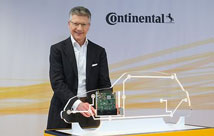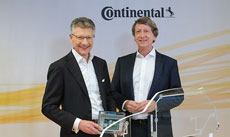In a sharply deteriorating market environment, German technology firm Continental says it has managed to achieve its adjusted targets for fiscal 2019, as the Hanover-based company chalked up sales in the past fiscal year of EUR44.5 billion (2018: EUR44.4 billion), while the adjusted EBIT margin was 7.4% (2018: 9.3%). While global automotive production declined by about 6% in 2019, according to the latest estimates, Continental’s organic sales development in the same period was down 2.6%, thus outperforming its markets.
Despite challenging conditions and a high level of capital expenditure, Continental says it achieved sound cash inflow before financing activities in the past fiscal year. Free cash flow before acquisitions and the effects of transforming the Powertrain division into an independent legal entity amounted to EUR1.3 billion.

Dr. Elmar Degenhart, Continental CEO, at a model of a connected vehicle
Looking back over the past year, Continental’s chairman of the Executive Board, Dr. Elmar Degenhart, said: “Continental continues to outperform its markets even in challenging times.” He added: “Last year the entire automotive industry suffered a clear downturn. In operational terms we put in a respectable performance overall, but ultimately the 2019 result, particularly in the automotive business, was not satisfactory.” At the same time, he pointed out that, in a challenging situation, the dividend proposed to shareholders is only slightly lower than last year’s.
But
for 2020, Continental does not anticipate any recovery in the economic
environment. The company expects global production of passenger cars and
light commercial vehicles in 2020 to decrease for the third year in a
row. It is likely to decline by 2 to 5% year-on-year. These estimates
take into account the impact of the coronavirus on production volumes,
as can be determined to date. Continental currently expects global
production to decrease by more than 10% year-on-year in the first three
months of this fiscal year. In China, the decrease is likely to be at
least 30% in this period. The market forecast does not include possible
further disruptions to production and the supply chain as well as demand
as a result of the continuing spread of the coronavirus. Such
disruptions cannot be gauged at the current time.

Dr. Elmar Degenhart, Continental CEO, and Wolfgang Schäfer, Continental CFO, with Continental High Performance Computer
“The economic environment will remain challenging in 2020,” explained Wolfgang Schäfer, Continental’s CFO. He added: “In addition to the declines in production, the globally interconnected automotive industry will be impacted by turbulence arising from the coronavirus epidemic, trade conflicts that remain unresolved, drastically more stringent emission regulations in Europe and the rapid digitalisation of business processes and products.”
Continental anticipates consolidated sales for 2020 of around EUR42.5 to EUR44.5 billion and an adjusted EBIT margin of around 5.5 to 6.5%. Sales in the new Automotive Technologies group sector together with the former Powertrain division are expected to amount to around EUR25.5-26.5 billion, with an adjusted EBIT margin of around 3-4%. Sales in the Rubber Technologies group sector are forecast to total around EUR17-18 billion, with an adjusted EBIT margin of around 10 to 11%.
The Transformation 2019–2029 structural program is Continental’s answer to the global decline in the automotive industry, the disruptive technological transition in the drive system sector, and the swifter digitalisation of products and business processes.
“2020 will be a transition year in our structural transformation. Our structural program and our new organisational structure will bring significant progress in the medium term,” said Degenhart.
At the same time, he pointed to the deterioration in the global economic environment that has occurred since the structural program was announced in September 2019. The decrease in the production of passenger cars and light commercial vehicles has now reached the level seen in the crisis years of 2008/09. This is being worsened further by the current spreading of the coronavirus and the corresponding reduction in production in China.
“The uncertainty in the industries that are relevant for us is growing rapidly. An economic recovery will take longer than anticipated,” said the CEO, adding: “That is why we are currently looking into how we can effectively respond to a weakening overall situation and its impact in the medium term, with further measures that go beyond our current structural program. Above all, we are at present pursuing two goals that are crucial for our success: continuously rising productivity and our sustainable competitiveness.” As matters currently stand, the company expects to have initial findings from this process in May 2020 and will provide further information in due course.
The CEO also said Continental is focusing all efforts on strengthening profitable growth areas. These include assisted, automated and connected driving; the implementation of new vehicle architectures and connectivity of cars with the help of new, high-performance computers; the business with software and data based on intelligent products made of plastic, rubber or electronics; as well as the industrial and end-customer business.
In the last fiscal year, Continental continued to undertake a high level of capital expenditure. “We are investing billions in the mobility of tomorrow. Only a small number of companies around the world can do that in these challenging times. At the same time, we have substantially stepped up our cost discipline in all areas,” explained CFO Wolfgang Schäfer.
In fiscal 2019 alone, Continental invested around EUR6.7 billion (2018: EUR6.3 billion) in research and development, as well as in property, plant and equipment, and software.
